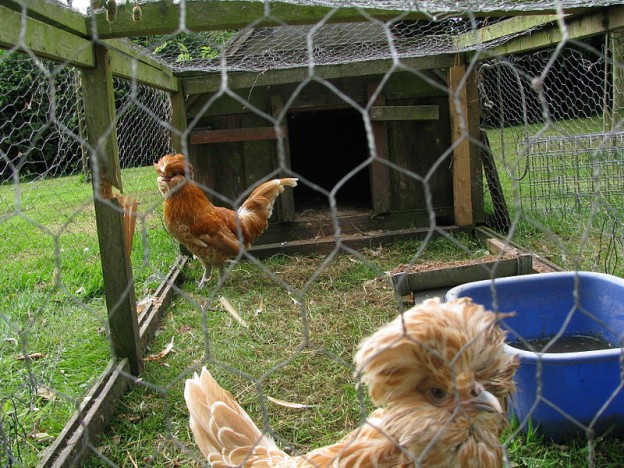According to the Control of Communicable Diseases Manual, all mammals are susceptible to rabies. Raccoons, skunks, foxes, bats, dogs, coyotes and cats are the likely suspects. Other animals like otters and ferrets are also high risk. Mammals like rabbits, squirrels, rodents and opossums are rarely infected.

No mention of birds.
Now, Indian researchers have reported the first case of rabies in a domestic fowl, a chicken, in the country, according to a study published in the journal, PLoS Neglected Tropical Diseases.
The authors note that experimental rabies virus infection in birds has been reported, but naturally occurring infection of birds has been documented very rarely. A few anecdotal reports were published in the late 1950’s, indicating the rare occurrence of rabies in birds; however, they remain uncorroborated by lack of additional reports with robust laboratory evidence of naturally acquired rabies in birds.
The chicken (Gallus domesticus), was bitten by a stray dog and died a month later. It’s carcass was sent to the rabies diagnostic laboratory. The brain tissue was positive for rabies viral antigens by fluorescent antibody test (FAT) confirming a diagnosis of rabies. Additional analysis revealed that the rabies virus strain from the domestic fowl belonged to a distinct and relatively rare Indian subcontinent lineage.
The authors say the significance of this finding indicates that spill over of infection even to an unusual host is possible in highly endemic areas. In addition, butchering and handling of rabies virus- infected poultry may pose a potential exposure risk.
Researchers conclude the present report indicates that rabies is a disease that can affect birds. Lack of obvious clinical signs and fewer opportunities for diagnostic laboratory testing of suspected rabies in a bird, may be the reason for the disease in these species being undiagnosed and probably underestimated.
Related:
- 160 people die of rabies worldwide everyday; India sees more than 20,000 deaths annually: Study
- Indian man eats dog’s heart to ‘prevent rabies’
- Rare human rabies survivor reported in India
Robert Herriman is a microbiologist and the Editor-in-Chief of Outbreak News Today and the Executive Editor of The Global Dispatch
Follow @bactiman63


Hello,
In response to the statement above that ferrets are high risk for rabies – there have been less than 20 cases of rabies reported in ferrets in the USA since the CDC started keeping track in 1954. They are actually a very low risk (FYI – there has never been a case of rabies being transmitted to humans by a ferret).
http://www.petmd.com/ferret/conditions/viral/c_ft_rabies
There has also been more rabies testing done on ferrets than there have been done on dogs & cats. They normally only show signs of the “dumb” form and pass away before the virus shows up in their saliva.
If you have any questions, please don’t hesitate to ask.
Thank you,
Mary McCarty
Shelter Chair, American Ferret Association, http://www.ferret.org
Shelter Director, Pennsylvania Ferret Rescue Assn, http://www.ferretrescue.com
Owner, Novel Beginnings Ferretry http://www.facebook.com/NBFerret
And once again we see someone only focused on the welfare their favorite ‘pet’ responding to a report of serious import in terms of both public health and conservation. I see no difference between your screeching and flailing and that of the misguided ‘animal lovers’ who promote feral cats. And like those misguided imbeciles, you don’t hesitate to spread misinformation in the name of your cause. Ferrets are mustelids. They are potentially VERY susceptible to rabies, as are their relatives skunks and otters.
Five’ll getcha ten you opposed New Zealand’s (apparently successful) program to eradicate invasive ferrets, despite the fact they and feral cats are the primary culprits in the extinction of 40% of that country’s native bird species.
There is a LOT more to the Animal Kingdom than the species mauldin, emotion-driven people embrace because they find them ‘cute’. Some people think piranha are ‘cute’. And isn’t THAT a fine reason to release some in your local reservoir?
Please tell me you don’t advocate ‘TNR’ as well.
I believe the focus of Mary McCarty’s comment was the dissemination of misinformation regarding the domestic ferret. You, Al-Hajji, failed to present any information to the contrary in your anti ferret rant. Mary’s facts are correct, domestic pet ferrets are at LOW risk for contracting rabies, and even lower risk for passing it to humans (which has never happened). Facts are facts.
The New Zealand ferrets, released by biologists that should have known better than to introduce a hybrid species into an island ecosystem, are not the ferrets referred to in this article.
By the way, skunks are not in the family mustelidae, they are mephitidae bright one.